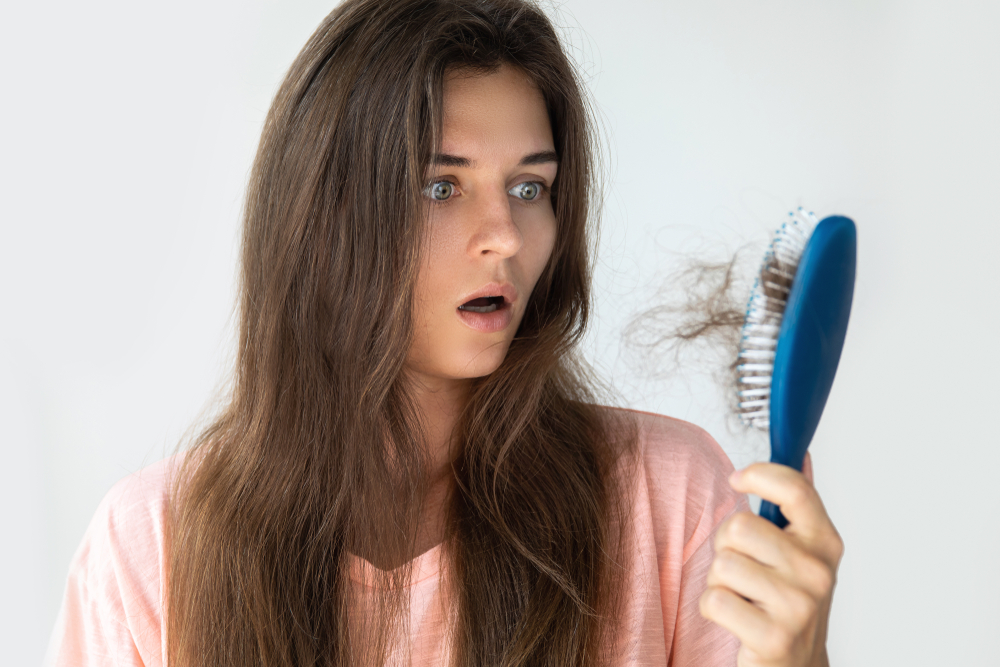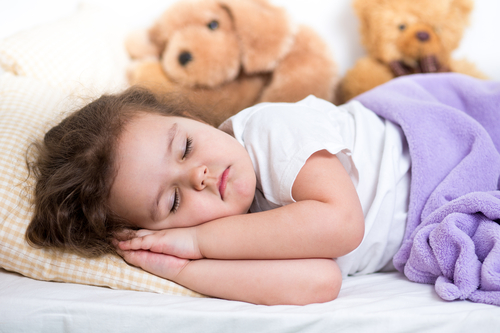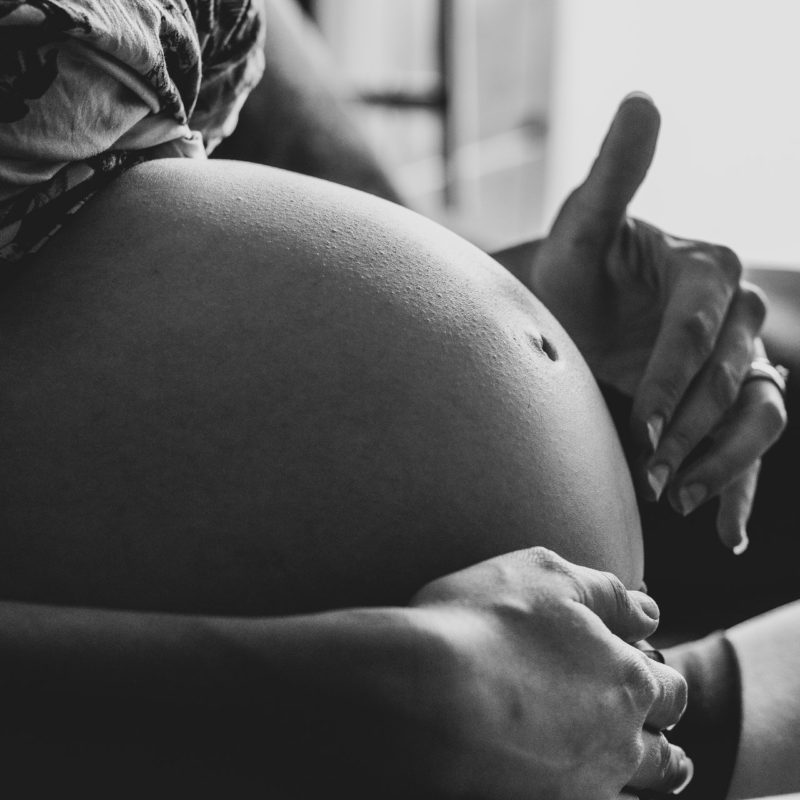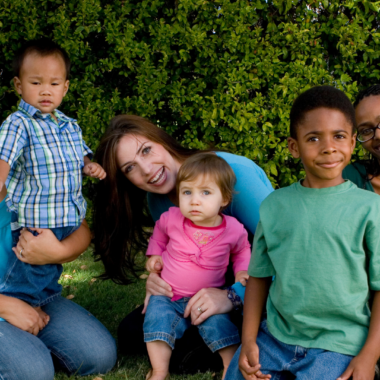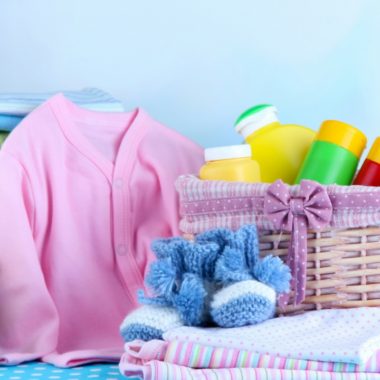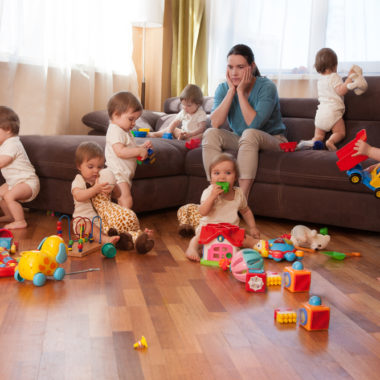Pregnancy for a lot of mothers came along with a full head of shiny long hair and glowing skin. This however seemed to be temporary as postpartum brought on a shocker for a lot of new moms – hair falling out in alarming clumps.
Pregnancy, delivery, and the pressures of the early stages of motherhood can be overwhelming, to say the least. From lack of sleep to lactation issues, it all seems like a roller coaster ride with no end in sight. One that still tops the chart for a good number of new moms is the excessive and significant hair loss that occurs postpartum.
Before pregnancy you can lose between 50-80 strands of hair in a day however after birth, this can go as high as 200-400 strands of hair in a day depending on how much hair you were shedding pre-pregnancy. So no, you are not imagining this experience or the amount of hair you see falling off.
What is postpartum hair loss?
Also known as ‘Telogen Effluvium’, postpartum hair loss affects an average of 40 to 60% of women after birth. According to the American Pregnancy Association, this shedding is believed to take place within the first 3 months after delivery, peaking at the 4th month and normal hair growth and strength is expected to return anytime within the 6th and 12th month.
Although there isn’t any explanation for this, however, not all women will experience postpartum hair loss and others may experience it in one pregnancy but would not experience hair loss in another.
The good news is, postpartum hair loss is temporary and your hair will stop shedding at this alarming rate in no time. During this period, there are tips and recommendations that can help manage this process. Before we jump to that, it is important to understand why your hair is falling out. This will make you worry less.
Related: What No One Ever Tells You About Motherhood – Our Community Tells it All
Why does hair loss occur postpartum?
Human hair growth occurs in a cycle with three distinct phases: anagen, catagen, and telogen also known as growth phase, resting phase, and falling out phase. While anagen and catagen loosely translate to the growth and renewal stages, telogen is the resting phase where hair follicles remain dormant for up to 3-4 months and then fall out to begin a new cycle.
The hormonal changes that happen during pregnancy – majorly the soaring estrogen and progesterone – cause many women to experience significant hair growth than normal. The rise in estrogen especially keeps the hair in an on-going growth stage preventing it from falling and resulting in the thicker and more lustrous hair you had during pregnancy.
Between 24-72 hours after birth, the body suffers a significant drop in estrogen and progesterone which makes the 9 months worth of hair that has been on the growth stage suddenly go into resting mode all at once. This is why the shedding is more profound than it would have been.
When should I worry about postpartum hair loss?
Postpartum hair loss is totally normal and should generally be nothing to worry about because it is temporary. After the one year mark, the growth cycle should reset and although your hair may not immediately go back to how it was, you should see a reduction in how much your hair sheds. If after one year you are still experiencing significant hair loss, you should talk to your doctor especially if it is accompanied by weight loss, anxiety, and rapid heart rate.
Will my hair ever go back to normal after postpartum hair loss?
There’s no reason why your hair would not go back to normal. However, some women may find that it may not be as it was pre-pregnancy or it may take longer to get back to how it used to be.
Remedies for postpartum hair loss
First off, to tackle hair loss, we must state here that all-round wellness goes beyond the steps you’re looking to take to get your hair back in good health and length. Remember that your diet plays an important role in your overall health, and the same applies here. You want to ensure that all essential nutritional requirements are met; from protein, ferritin, and Vitamin D to iron, zinc, blood sugar, and more.
Follow a healthy diet plan that encourages hair growth with foods like spinach, eggs, fatty fish, sweet potatoes, avocados, nuts, and seeds. Also, incorporate vitamin supplements into your daily routine to work their way from within.
If you want to put an end to the flimsy tufts of hair falling off at the slightest touch, these remedies will come in handy:
Tips on handling postpartum hair loss
1. Keep hair moist:
Hair needs moisture to thrive, retain elasticity, and prevent breakage. Maintain a routine of moisturizing and conditioning your hair to keep it soft and supple. Fill a bottle of spray bottle with water and a little of whatever leave-in conditioner of choice. Wake your hair up in the morning by spraying this mixture.
2. Skip the styling:
Avoid all heating products at this time and allow your hair to air dry when washed or set your hairdryer to a cool setting. Heat can further damage your hair and as you know cause it to thin out even more.
3. Be gentle with your hair:
Take extra care when dealing with your hair to avoid too much hair loss. Do not comb your hair when it’s very dry to avoid tearing and splitting, try spraying a small amount of water or water with a bit of leave-in conditioner to add a bit of moisture before combing and do so gentle and in sections. This minimizes how much hair you lose as against combing dry and all at one go.
4. Avoid hair styles that stress your hair:
A ponytail is a mom’s best friend however this may not be best for your hair during this period. Forcefully pulling your hair stresses your roots and edges. This also goes for tight braids, cornrows, and weaves. Try a relaxed braid that falls to your back instead.
5. Go natural:
It is best to avoid harsh chemicals during this time like hair dyes or coloring and harsh gels and sprays used in styling.
6. Use makeup on hair as a temporary solution
If your hair is so thin to the point where the scalp becomes visible especially in your front hairline, use eye shadow or eyebrow pencil in the color that is closest to that of your hair to fill out these spots.
Product Recommendations For Postpartum Hair Loss
Good quality products from your regular shampoo and conditioner to hair masks that help the hair take up a more bulky and voluminous appearance alongside supplements and vitamins will be helpful during this period.
Postpartum Vitamins and Supplements
Vitamins and supplements have shown to yield great results during postpartum and are recommended by dermatologists. Vitamin and supplements for hair loss are no exception. Before taking any of these especially if you are breastfeeding, it is advisable to consult with your doctor.
Nutrafol Hair Wellness From Within

The results from this has been impressive. Made with all natural ingredients, it works to balance dihydrotestosterone (DHT), a hormone which causes baldness in some cases with both men and women. It may not be suitable when breastfeeding and it’s advisable to consult your doctor.
Sugarbear Hair Vitamins

Packed with Vitamin A, Vitamin C, Vitamin D, Vitamin E, Vitamin B-6, Folic Acid, Vitamin B-12, Biotin, Pantothenic Acid, Iodine, Zinc, Choline, Inositol, as the active vitamins and minerals, this is a recommended go-to for postpartum hair loss and is chewable.
Nature’s Bounty Vitamins with Biotin & Vitamin C

This vitamin gummies, although endorsed by a lot of celebrities as a pure magic, has been said by a lot of postpartum women to actually work for their hair loss. It contains biotin which is an ingredient for hair loss and vitamin C.
Hair Care Products For Postpartum Hair Loss
Using the right hair care product during this period can make a huge difference in the overall outcome of your hair. From shampoos and conditioners to the type of brush you use and oils. Some recommendations are;
John Frieda Volume Conditioner
Lipogaine Big 5 Hair Stimulating Shampoo for Hair Thinning & Breakage, for All Hair Types
Pura D’or anti thinning shampoo and conditioner
Rogaine For Hair Thinning And Loss Topical Treatment
Home-Made Rice Water to Strengthen and Grow Hair
This is a home-made remedy and the most cost-effective way that has been on the lips of a lot of women in general and also from women who have suffered from postpartum hair loss. It is the starchy water that is taken from rice which has been cooked or soaked for a period of time. It has been promoted a lot in recent years by hair bloggers and vloggers.
Rice water is an ancient secret used by women in Japan, China, and Southeast Asia that promotes hair growth. The protein in rice water reduces shedding, seals split ends, strengthens hair strands, promotes growth, and leaves hair shiny and smooth.
Related: 7 Answers To The Most Frequently Asked Questions As A First-Time Mom
How to make and use rice water:
Although there are a number of ways to make rice water from boiling to soaking for only an hour to a few days, this is the most popular way.
Step 1: Rinse rice thoroughly to remove dirt and starch
Step 2: Soak rice in double or triple the rice quantity and leave for 1-3 days to ferment.
Step 3: Strain rice and turn water into a bowl or spray bottle
Step 4: Wash your hair with shampoo, rinse with clean water, and then rinse again or use a spray bottle to soak hair in rice water.
Step 5: Cover hair with a plastic cap for at least 30 minutes and at most 1 hour.
Optional Step: It is highly advised to do deep conditioning on top of the rice water and leave for an extra 30 minutes.
Step 6: Shampoo hair, use a conditioner, and rinse off with clean water.
Note that rice water is not meant to be used too frequently. Once a week or bi-weekly is recommended to avoid shedding of hair from protein overload.
It is important to note here that postpartum hair on its own is not acute enough to cause balding or permanent hair loss. More serious hair loss – especially in pregnancy, may be linked to vitamin or mineral deficiencies. In this case, we advise that you check in with your doctor for recommendations or if needed, referral to a nutritionist who can help determine the right foods to boost any shortage your body may be experiencing.
Remember that at this period, nature is taking its course on your body, and it’s best to not stress so much over it and let the process go through. In no time, you will get your hair back to normal and maybe sooner depending on how much time and dedication you are willing to give.
- How To Revive Your Sex Life After Baby - October 17, 2023
- The Sona App Aims To Make Your Child “Sleep Like A Baby” And We Tested It - May 14, 2023
- 7 Ways To Get Some Alone Time As A Mom - March 1, 2023
